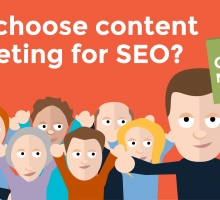Marketing is changing and it’s changing because of the way we take in and process information and how we choose to view and use messages directed at us. In the past, we sat and watched the adverts between television programmes, read the adverts for beauty products in a magazine and believed the claims and clicked on flashing buttons and banners on a website which promised amazing deals. We now skip past the adverts on the TV with our remote control, take the Photoshopped skin enhancing results of a new moisturiser with a pinch of salt and don’t click on links due to a mixture of awareness of it possibly containing a virus, along with the fact we have outgrown the need to be told to ‘click here’. Consumers want to be treated as intelligent individuals and to be able to make decisions through the gathering of their own opinions about a company before making a purchase rather than being told what to do.
Marketing then needs to be smarter as we are all ignoring many of the messages being presented to us each day and this is where the world of content marketing comes to the fore.
What is content marketing?
Content marketing is the creation and distribution of high quality content which delivers value within a relevant environment. It is crafted to appeal to a particular audience and looks to increase their likelihood of becoming a customer and so becoming a consumer asset.
The main objective of content marketing is to communicate with, attract and then keep customers. It does this by creating content which is of value, relevance and is presented in a consistent way to alter the way a consumer behaves. Content marketing is ongoing, it’s not a one-off ‘hit’ and should be a major part of any marketing strategy.
How is content marketing used?
Content marketing aims to communicate with prospective and existing customers without actually selling to them. It’s about making the buyer feel good about a brand or a product rather than telling them to buy an item or shop at a certain store. It shares information which can enhance purchasing decisions and in turn delivers loyalty through repeat business. Content marketing is more than just content. It’s an intrinsic mix of relationship building and identity which in turn leads to the natural desire of the target audience to want to read more content.
How have marketing methods evolved?
Content marketing has been a successful online marketing tool for a number of years but is now only starting to be seen as the serious front runner for those who want to grow fruitful relationships with new and existing customers.
Past online marketing strategies centred on techniques which have produced quick results and have the almost instant visible – if short lived – success in a website rising up the SERPs. Varieties of tactics were employed and heavily used, the majority of which centred around creating backlinks from other websites. At the time, this was seen as the way to improve visibility – the magic bullet of online marketing – even though it was clearly a manipulation of page rankings because many links were spammy and were placed on irrelevant sites and utilised content which did the company no favours at all due to the poor quality.
Google stepped in and have rolled out a number of algorithm changes over the last couple of years in a bid to stamp out spammy black hat marketing techniques. These updates have resulted in thousands of websites receiving penalties and some have been removed from the search results entirely. This has in turn stopped the majority of traffic to the affected sites and the gradual eradicating of the worst offending sites. Companies hit with a penalty have then faced an uphill struggle to first have the penalty removed and to then recover customer respect.
With the kind of techniques Google frowns upon now being very apparent, it’s about working to produce marketing content which Google rewards and also learning to think about the needs of the site visitor and the customer. This is where content marketing rightfully fills the gap created by the removal of previous unethical marketing methods.
Link building versus content marketing
 Link building has certainly not disappeared. It’s still possible to buy packages of links and possibly see a brief successful climb up the rankings however, any gains will be short lived and you are playing with fire as Google is predicted to roll out another algorithm update imminently called Penguin 3.0. This update will further build on the last Penguin update targeting areas such as irrelevant and spammy backlinks.
Link building has certainly not disappeared. It’s still possible to buy packages of links and possibly see a brief successful climb up the rankings however, any gains will be short lived and you are playing with fire as Google is predicted to roll out another algorithm update imminently called Penguin 3.0. This update will further build on the last Penguin update targeting areas such as irrelevant and spammy backlinks.
There are some marketers who aren’t keen to make the transition to content marketing because they feel that link building works for them. They feel that quick results matter and don’t see the point in changing direction. This is a dangerous stance to take when all around others are realising that they need to expand their ways of thinking and to look at a more holistic approach.
Different kinds of content marketing
There are a number of different ways to use content marketing and how they can be disseminated to achieve success. All should form part of the mix of a marketing strategy with the key being quality over quantity. Content is an integral part of a marketing plan and shouldn’t be seen as a separate or isolated element.
Whilst we are now an online world of social networkers, content marketing should be seen as just as important as having a social network presence and content should be developed alongside a social media strategy and not separately from it. Most of those visitors a business is communicating with through social media are existing customers. Social media should be used to create and develop interest in content and the desire to want to read more, rather than just raising awareness of who a company is.
With the evolution of the Google algorithm updates, the focus for the search engines now is to reward those companies that have realised the benefit of content marketing and have made the transition to publishing quality work on a consistent basis.
A successful PR strategy isn’t about the direct selling of products and services or the machinations of a business. PR is about developing a relationship with those using the site and encouraging them to love a brand both on and offline because of the issues it talks about rather than pushing sales messages.
Whilst inbound marketing is at the core of any business, it’s can’t now create leads as easily through the SEO marketing tactics of a few years ago. Content now is the key; it’s about using it to create and drive inbound traffic and to generate leads.
How is content marketing beneficial?
Creating, developing and embracing a content marketing strategy leads to increased visibility, higher levels of trust and a nurturing of the loyalty of customers. With 70% of consumers preferring to get to know a company via their content articles rather than their adverts and 60% feeling more positive about a company after reading custom content on their site, content marketing is beneficial in that it engenders trust, creates a purchase influencing tool and is seen as in the top three reasons an audience chooses to follow a brand on social media.
How to succeed at content marketing?
Content marketing should be seen as taking a holistic approach to your marketing strategy and treating it as a long-term investment rather than a quick fix. The main ways to succeed at content marketing are differentiation and excellence.
The trend for creating content is growing and there is now a need to create copy which really stands out and is different in some way to all around it. It’s about making content incredibly useful or looking at techniques such as a video infographic, podcasts, case studies, ebooks and guides as well as blogs.
Make excellence the key word of any content marketing strategy and the surrounding elements will naturally fall into place. It’s not just about high quality writing, it’s also about the emotional appeal of the content and the simple fact it is ‘better’ than the work of others.
Content marketing is not about achieving results quickly; there’s every possibility that it will be a period of time – months perhaps – before the momentum starts to really grow, but with the measured placing of a number of polished pieces of content marketing using different techniques and really appealing to the selected audience, the outcome will be raised loyalty, increased respect and enhances satisfaction of customers which will far outlive the quick fix method of link building.
If you feel that you want to find out how content marketing can work for you, talk to one of the team at High Impact. They can guide you through developing a strategy which works for your business objectives and work with you to produce excellent content.
Author: Anthony Biggs is the Digital Marketing Manager for High Impact.
You can find him on Google + here.




